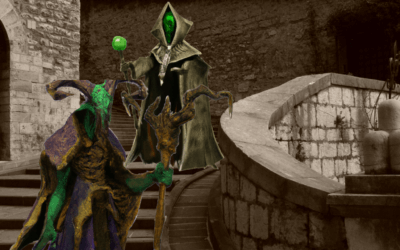Non Playing Characters
NPC
How NPCs Help to Drive the Plot and Develop the World of RPGs. Non-player characters, commonly known as NPCs, are crucial to the world building of any roleplaying game. Without NPCs, there would be no one to offer quests, provide advice, or even move the plot along. In this blog post, we’ll explore how NPCs can help to create a more immersive and believable game world for everyone involved.
Benefits
Non-player characters, often seen as mere background players in a video game or roleplaying scenario, can play a vital role in the story. Whether they move the plot forward with new quests and missions, provide guidance for those who are lost, or act as catalysts for character development, NPCs serve a crucial function. One of the most important roles that NPCs play is the quest-giver. Quests are essential to any roleplaying game; they give players a sense of purpose and drive the plot forward. Without NPCs to offer them, players would quickly become bored and lose interest in the game. In addition, quests can introduce new concepts and ideas to players, helping to expand their understanding of the game world.
NPCs can also offer advice about how to solve problems. This is especially useful when players are stuck and don’t know what to do next. Players can get clues about where to go or what to do next by talking to an NPC. This can help keep players engaged and prevent them from getting frustrated and giving up on the game.
Finally, NPCs can help populate the game world and make it feel more real. Having NPCs interact with each other creates a sense that there is a real society going on behind the scenes—even if the player never sees it themselves. This helps players feel like they are part of a living, breathing world rather than just a flat map with empty buildings. The next time you’re running a game or embarking on a roleplaying adventure, take the time to talk to and interact with the non-player characters – you never know what valuable contributions they might make to your story. With that in mind, I offer these three insights.
Road less traveled
Role Playing Games offers gamers the unique opportunity to control a character and live out their fantastical story within the game world. These immersive games can be further enhanced by side quests, which allow players to embark on additional adventures and truly utilize their imagination. These optional tasks often provide added depth to the game’s overall plot, potentially offering new insights into characters or uncovering hidden secrets within the world itself. And while they may not always directly advance the main storyline, side quests can add hours of gameplay and contribute to a richer gaming experience overall. So if you’re looking for more variety in your RPG journey, don’t forget to keep an eye out for those helpful side quests. They might lead you on an epic adventure you could never have anticipated.
Amicus vel inimicus
Let’s face it, without NPCs, there would be no side quests; those little tasks often provide crucial information or a chance to level up before taking on the next big challenge. But let us not forget that NPCs can also potentially deceive. They may offer false information, sending players on wild goose chases down dead ends. However, as sneaky as some NPCs may be, they ultimately enrich the gaming experience by adding layers of complexity and unpredictability for players to navigate through. So, the next time you encounter an NPC offering a side quest, think carefully before accepting – there may be more at stake than simple reward and recognition. Thank you, NPC characters, for constantly challenging us and keeping us on our toes.
3 doors, 1 choice
In a roleplaying game, NPCs can serve as guides, allies, and adversaries for players. But when used effectively, they can also force players to think outside the box and explore new paths. Take the Monty Hall Problem as an example – a classic brain teaser in which a player must choose between three doors, with one concealing a prize. Many players might automatically choose Door 1, but an NPC could suggest choosing Door 2 or 3 instead – leading the players to discover new options they may not have noticed before. This way, NPCs can challenge players to approach problems and make decisions differently, ultimately enhancing their gaming experience. So next time you set up your game session, consider how NPCs can bring something unexpected to the table and encourage critical thinking.

©Geoffrey Schumann. Not for resale. Permission is granted to print this document for personal use only.
The others
& them too
Evil Villains
Villains are a necessary evil in any story. They provide the conflict that makes for an interesting plot. Without villains, there would be no one to defeat and no story to tell. But what makes a good villain? What makes them believable and worth rooting against? We will explore the Villains and Evil of Ertha from beyond the Shadowgate.
Squires For Hire
Squires for Hire are available for hire in every city, town, and village and come in all shapes and sizes.
Requiem Of The Fallen Night
Requiem of the Fallen Night is an old Malefactor called forth from the 9th Gate. The sharp pain, feeling the loss, as the requiem bell struck nine.
Holder Merchants
Holder Merchants can store items in a pocket dimension, ensuring they are always kept safe and secure. They are typically depicted as tall and slender, wearing a hooded cloak that conceals their face.
Oo-LÖc’s Outfitters
Embark on your grand adventures in the world of Ertha with Oo-LÖc’s Outfitters as your trusted companion, providing you with expertly curated tools, resources, and treasures. Our dedication to serving adventurers with a personalized touch and items of unmatched quality makes us not just a store, but the starting point of a thousand unforgettable tales
Evil Within
Ertha is a truly dangerous place. The evil you encounter is going to be unpleasant. Best to know what you’ll be battling.





